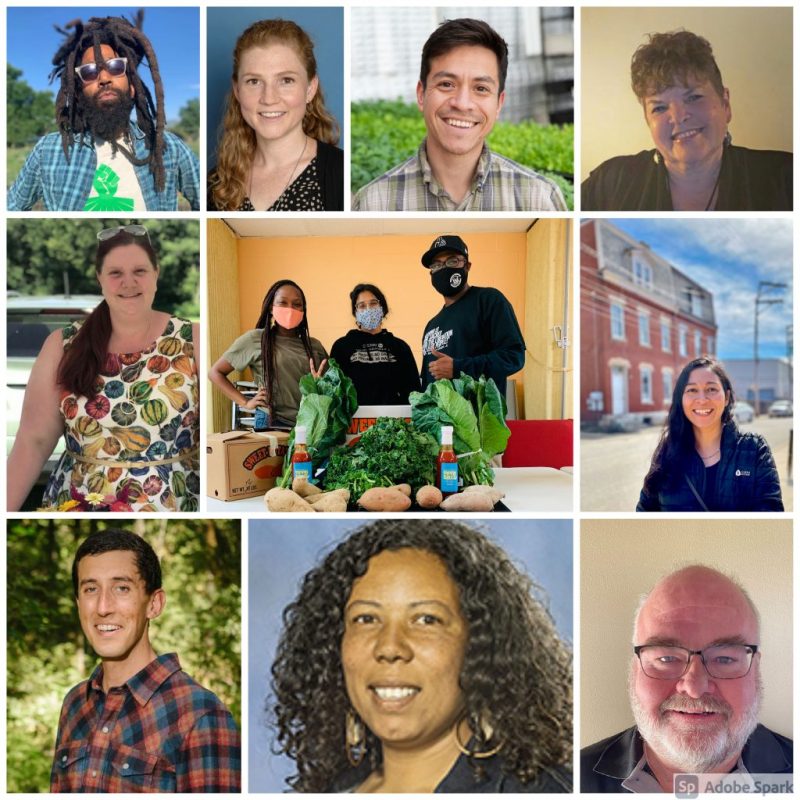Teams from Across the U.S. Working to Use Institutional Investment to Build Community Wealth
April 2021 — The Wallace Center is thrilled to announce the six community-based teams participating in our inaugural Institutional Investment Accelerator, made possible through the generous support of the Kresge Foundation. Representing coalitions and collaborative efforts in urban, rural, coastal, and heartland communities, the teams share a common goal of partnering with and seeking investment from institutions to increase community health, wealth, and power. The Accelerator will focus on engaging institutions in building up the supply chain infrastructure and supportive ecosystems necessary to fulfill institutional procurement goals.
Through the Accelerator, teams from Baltimore, West Virginia, Northwest Arkansas, Chicago, Denver, and Portland will shape and implement strategies based on their goals and local assets. The teams work in a variety of contexts, including nonprofits, faith-based communities, food businesses, healthcare, city government, and universities. While they come from diverse communities and settings, all six teams are engaging institutions as key partners in their food systems change efforts, with an emphasis on building economic opportunity with and for Black-, Indigenous-, and other People of Color (BIPOC) food producers.
“Food sovereignty, community wealth-building, and economic justice for BIPOC farmers are at the core of what we do at the East Denver Food Hub and participating in this Accelerator is an amazing opportunity to develop and advance our mission,” said Roberto Meza, Director of Operations for the East Denver Food Hub and the Denver team lead.
Across the 18-month program, each team will work with an advisor and receive $10,000 in technical assistance funds to advance their strategies. The Wallace Center will also facilitate digital trainings, learning journeys, and peer-to-peer collaborations between the teams and the broader Food Systems Leadership Network.
The participating teams are:
- Baltimore — A team of staff from the Black Church Food Security Network will improve supply chain logistics to link BIPOC farmers with Black churches in the mid-Atlantic.
- West Virginia — This team will leverage a new state law requiring 5 percent local purchasing at state institutions to ensure that the procurement supports small and marginalized farmers.
- Northwest Arkansas — The team from Arkansas is working to facilitate local procurement and attract more investment from hospitals to support BIPOC farmers.
- Chicago — This team is working to develop a racially and socially equitable regional food supply chain that can meet increasing institutional demand for good food, driven by the region’s Good Food Purchasing Policy.
- Denver — The Denver team is working to improve the supply chain for BIPOC farmers to ensure that the city’s Good Food Purchasing Policy contributes significantly to community wealth.
- Portland — This team will be focused on building community wealth and greater economic resilience among BIPOC food producers by utilizing hospital-owned land for food production.

“We are so excited to partner with these diverse and creative leaders to address perennial barriers and systemic inequities that limit BIPOC-owned food and farm businesses’ ability to thrive and build wealth in their communities,” says Susan Schempf, Co-Director of the Wallace Center. “Institutions can be powerful partners in building economic opportunity, and we’re eager to learn alongside the teams about how to more meaningfully engage anchor institutions — beyond procurement — in our collective efforts to shift food systems toward equity.”
The Accelerator kicked off in March and will run through the summer of 2022. For more information about the Accelerator and Wallace Center’s efforts to build a more sustainable, equitable, and resilient food system, visit us online at foodsystemsleadershipnetwork.org.

